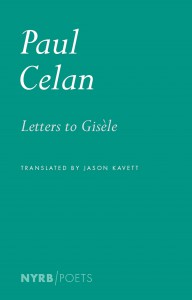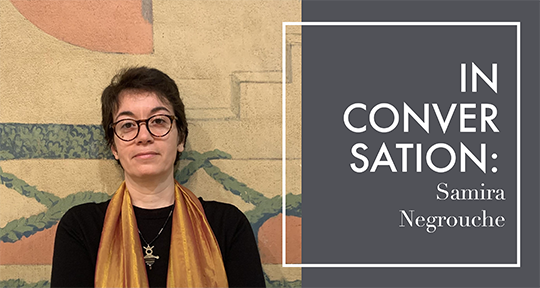For this week’s Translation Tuesday, we bring you an excerpt from “Alone,” Nesrine Slaoui‘s intricate portrait of immigrant life in modern France, translated by Frances Egan. In these three spare, plainspoken vignettes, the lives of two women intertwine: Anissa, the child of two Moroccan immigrants in the Argenteuil banlieue, and Nora, a Maghrebi businesswoman in Clichy. Despite their various attempts to assert control over their own lives—despite Anissa’s attempt to bond with a new classmate, despite Nora’s attempts to stand up for herself and advocate for change in her workplace—their actions are continually circumscribed by greater social forces, by the historical inertia manifest in the petty cruelty and unexamined prejudice of their classmates and colleagues. What follows is a forceful examination of racism and economic inequality in modern France—and a challenging reminder that none of us is as free as we would like to believe.
3 September 2021
Cité Champagne, Argenteuil
In Marseille’s Quartiers Nord, Bricarde and Castellane, the drug dealing hotspots where a kid dies every fortnight from a Kalashnikov bullet, the windows offer a dreamy and unobstructed view of the Mediterranean Sea. A tease, an enviable and deceptive skyline, since the only place you can actually access the beach is from one small spot at L’Estaque. Here, in the much quieter cité Champagne, about twenty kilometres northwest of Paris, the balconies of the social housing block offer a panoramic view of the capital and its monuments, the Eiffel tower, sparkling at night, in prime position. The day they moved in, Karim kept this view until last, as a surprise for his wife Yamina. They had both been amazed that such luxury could penetrate this isolated spot. It made you wonder if the town planners and architects of these housing estates were trying to maximise the contrast between here and there, or if they wanted to soften the dreary dereliction of this Argenteuil ghetto. Perhaps they imagined the residents gazing into the distance and forgetting the reality at their feet: the broken lifts, the lobbies smelling of urine.
On the ninth floor of her tower, Anissa wasn’t thinking much about the skyline. Locked away in her room, she was trying to take a photo of herself on her phone. But even standing on her tiptoes, so that her legs looked longer, and arching her back, to emphasise her bum, she didn’t have one shot she could post on Instagram. And that’s despite knowing every tip there was to enhance your figure: stand slightly side-on, tuck your tummy with a hand to your waist. Expression wise, she made sure not to smile and kept her mouth slightly open to hold her delicate features in place. All those hours spent scrolling social media, day after day, meant she followed the rules without even realising it. But it didn’t matter. The reflection in the rectangle mirror in her bedroom wouldn’t do what she told it to, and she couldn’t make her body match the profiles that flitted across the screen. Without filters, without tricks, her body and her face were ordinary; her imperfections, her asymmetries were there for everyone to see. None of it looked like the calibrated social media ideal, like the apparitions, the fantasies. She couldn’t compete, she couldn’t fight. And she was tormented by the gap between what she wanted to look like and her modest and underwhelming reality. The only thing she liked was her flat teenage stomach. Everything else was too small, too skinny, not woman enough.





 This spirit of formal ambition is by no means limited to our Special Feature. After all, “as the reality of each time changes,” says
This spirit of formal ambition is by no means limited to our Special Feature. After all, “as the reality of each time changes,” says 










Blog Editors’ Highlights: Winter 2025
Reviewing the manifold interpretations and curiosities in our Winter 2025 issue.
In a new issue spanning thirty-two countries and twenty languages, the array of literary offers include textual experiments, ever-novel takes on the craft of translation, and profound works that relate to the present moment in both necessary and unexpected ways. Here, our blog editors point to the works that most moved them.
Introducing his translation of Franz Kafka’s The Trial in 2012, Breon Mitchell remarked that with every generation, there seems to be a need for a new translation of so-called classic works of literature. His iteration was radically adherent to the original manuscript of The Trial, which was diligently kept under lock and key until the mid-fifties; by then, it was discovered exactly to what extent Max Brod had rewritten and restructured the original looseleaf pages of Kafka’s original draft. It is clear from Mitchell’s note that he considers this edit, if not an offense to Kafka, an offense to the reader who has lost the opportunity to enact their own radical interpretation of the work: an interpretation that touched Mitchell so deeply, he then endeavored to recreate it for others.
In Asymptote’s Winter 2025 Issue, the (digital) pages are an array of surprising turns of phrase and intriguing structures—of literature that challenges what we believe to be literature, translations that challenge what we believe to be originality, and essays that challenge what we believe to be logic. I am always drawn to the latter: to criticism, and writing about writers. As such, this issue has been a treat.
With the hundredth anniversary of Kafka’s death just in the rearview and the hundredth anniversary of the publication of The Trial looming ever closer, the writer-turned-adjective has not escaped the interest of Asymptote contributors. Italian writer Giorgio Fontana, in Howard Curtis’s tight translation, holds a love for Kafka much like Breon Mitchell. In an excerpt from his book Kafka: A World of Truth, Fontana discusses how we, as readers, repossess the works of Kafka, molding them into something more simplistic or abstract than they are. In a convincing argument, he writes: “The defining characteristic of genius is . . . the possession of a secret that the poet has no ability to express.” READ MORE…
Contributors:- Bella Creel
, - Meghan Racklin
, - Xiao Yue Shan
; Languages: - French
, - German
, - Italian
, - Macedonian
, - Spanish
; Places: - Chile
, - France
, - Italy
, - Macedonia
, - Switzerland
, - Taiwan
, - Turkey
; Writers: - Agustín Fernández Mallo
, - Damion Searls
, - Elsa Gribinski
, - Giorgio Fontana
, - Lidija Dimkovska
, - Sedef Ecer
; Tags: - dystopian thinking
, - identity
, - interpretation
, - nationality
, - painting
, - political commentary
, - revolution
, - the Cypriot Question
, - the Macedonian Question
, - translation
, - visual art
, - Winter 2025 issue
, - world literature